by Jon Ronson
April 22, 2016
NOTICE: THIS WORK MAY BE PROTECTED BY COPYRIGHT
YOU ARE REQUIRED TO READ THE COPYRIGHT NOTICE AT THIS LINK BEFORE YOU READ THE FOLLOWING WORK, THAT IS AVAILABLE SOLELY FOR PRIVATE STUDY, SCHOLARSHIP OR RESEARCH PURSUANT TO 17 U.S.C. SECTION 107 AND 108. IN THE EVENT THAT THE LIBRARY DETERMINES THAT UNLAWFUL COPYING OF THIS WORK HAS OCCURRED, THE LIBRARY HAS THE RIGHT TO BLOCK THE I.P. ADDRESS AT WHICH THE UNLAWFUL COPYING APPEARED TO HAVE OCCURRED. THANK YOU FOR RESPECTING THE RIGHTS OF COPYRIGHT OWNERS.
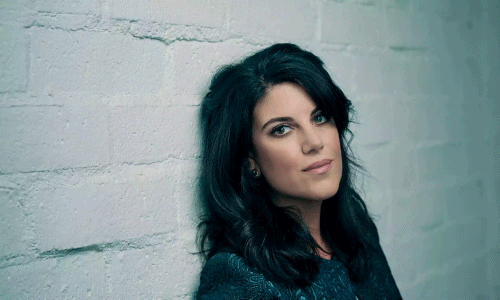
One night in London in 2005, a woman said a surprisingly eerie thing to Monica Lewinsky. Lewinsky had moved from New York a few days earlier to take a master’s in social psychology at the London School of Economics. On her first weekend, she went drinking with a woman she thought might become a friend. “But she suddenly said she knew really high-powered people,” Lewinsky says, “and I shouldn’t have come to London because I wasn’t wanted there.”
Lewinsky is telling me this story at a table in a quiet corner of a West Hollywood hotel. We had to pay extra for the table to be curtained off. It was my idea. If we hadn’t done it, passersby would probably have stared. Lewinsky would have noticed the stares and would have clammed up a little. “I’m hyper-aware of how other people may be perceiving me,” she says.
She’s tired and dressed in black. She just flew in from India and hasn’t had breakfast yet. We’ll talk for two hours, after which there’s only time for a quick teacake before she hurries to the airport to give a talk in Phoenix, Arizona, and spend the weekend with her father.
“Why did that woman in London say that to you?” I ask her.
“Oh, she’d had too much to drink,” Lewinsky replies. “It’s such a shame, because 99.9% of my experiences in England were positive, and she was an anomaly. I loved being in London, then and now. I was welcomed and accepted at LSE, by my professors and classmates. But when something hits a core trauma – I actually got really retriggered. After that I couldn’t go more than three days without thinking about the FBI sting that happened in ’98.”
Seven years earlier, on 16 January 1998, Lewinsky’s friend – an older work colleague called Linda Tripp – invited her for lunch at a mall in Washington DC. Lewinsky was 25. They’d been working together at the Pentagon for nearly two years, during which time Lewinsky had confided in her that she’d had an affair with President Bill Clinton. Unbeknown to Lewinsky, Tripp had been secretly recording their telephone conversations – more than 20 hours of them. The lunch was a trap. When Tripp arrived, she motioned behind her and two federal agents suddenly appeared. “You’re in trouble,” they told Lewinsky.
She was bustled upstairs to a hotel room filled with prosecutors and federal agents. She started to cry. They told her they were investigating claims that President Clinton had sexually harassed a former Arkansas state employee, Paula Jones, and that if Lewinsky didn’t cooperate with them she’d be charged with perjury and jailed for 27 years.
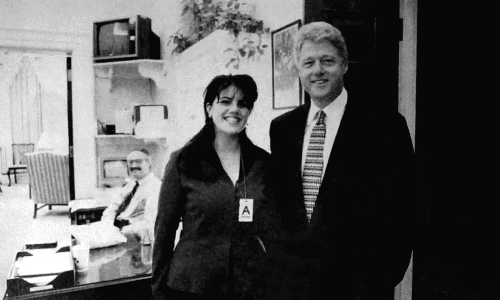
Lewinsky with Bill Clinton at the White House in 1995; this image was later used as evidence in the Starr report. Photograph: Rex/Shutterstock
“How long were you retriggered for after that night in London?” I ask her.
“The impact reverberated throughout my year there,” she says.
“What does retriggered actually mean?” I ask. “What are the physical symptoms?”
“That varies for me, depending on what trauma is being retriggered – lucky me,” she replies. “It’s as if I’m seeing and feeling on fast-forward – a quicker pace.”
Lewinsky doesn’t like thinking about her past. It was hard to get her to agree to this interview. She rarely gives them and she nearly cancelled this one. I approached her on several previous occasions, when I was writing a book on public shaming, and she kept saying no.
It’s not because she’s difficult. She isn’t. She’s very likable and smart. But it feels as if I’m sitting with two Lewinskys. There’s the open, friendly one. This is, I suspect, the actual Lewinsky. In a parallel world where nothing cataclysmic happened in the 1990s, I imagine this would be the entire Lewinsky. But then there’s the nervy one who sometimes suddenly stops mid-sentence and says, “I’m hesitating because I have to think through the consequences of saying this. I still have to manage a lot of trauma to do what I’m doing, even to come here. Any time I put myself in the hands of other people…”
“What’s your nightmare scenario?” I ask her.
“The truth is I’m exhausted,” she says. “So I’m worried I may misspeak, and that thing will become the headline and the cycle will start all over again.”
The reason why she finally agreed to meet me, despite her anxieties, is that the Guardian is highlighting the issue of online harassment through its series The web we want – an endeavour she approves of. “Destigmatising the shame around online harassment is the first step,” she says. “Well, the first step is recognising there’s a problem.”
Lewinsky was once among the 20th century’s most humiliated people, ridiculed across the world. Now she’s a respected and perceptive anti-bullying advocate. She gives talks at Facebook, and at business conferences, on how to make the internet more compassionate. She helps out at anti-bullying organisations like Bystander Revolution, a site that offers video advice on what to do if you’re afraid to go to school, or if you’re a victim of cyberbullying.
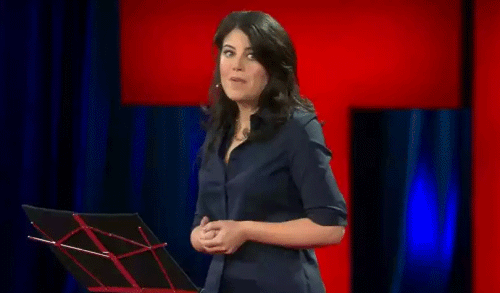
Lewinsky’s March 2015 TED talk. ‘If I’m stuck with my past, giving it purpose feels meaningful to me.’ Photograph: ted.com
A year ago she gave a TED talk about being the object of the first great internet shaming: “Overnight, I went from being a completely private figure to a publicly humiliated one worldwide. Granted, it was before social media, but people could still comment online, email stories, and, of course, email cruel jokes. I was branded as a tramp, tart, slut, whore, bimbo, and, of course, ‘that woman’. It was easy to forget that ‘that woman’ was dimensional, had a soul, and was once unbroken.” Lewinsky’s talk was dazzling and now gets taught in schools alongside Nathaniel Hawthorn’s The Scarlet Letter. I can think of nobody I’d rather talk to about the minutiae of online bullying – who does it and why, the turmoil it can spark, and how to make things better.
***
Monica Lewinsky grew up in Beverly Hills. Her father was an oncologist, her mother an author (she wrote the biography The Private Lives Of The Three Tenors). She had weight issues as a teenager. Beverly Hills is a bad place to grow up with weight issues. “I was very sensitive, so I couldn’t take a joke,” she says. “I remember sitting on my parents’ bed and them practising with me how to take a joke, how to not cry. I remember one very specific day in the playground when a group of girls had concocted some game. They’d say a number and it would mean something – run up and push me, or make a face at me, or say something stupid.” She pauses. “Those memories inform a lot of who we become. They contributed to me not having a strong sense of self. Look. I could sit and cry all day about kids being afraid to go to school.”
“Do you remember what the girls said to you?” I ask.
“No, I just remember the feeling,” Lewinsky says. “And I just stood there. Why didn’t I walk away? That’s an interesting…”
She trails off. Why didn’t she just walk away? Her question sparks a memory. A couple of years ago, I interviewed a care worker called Lindsey Stone who was shamed online for a joke that came out badly. She posted a photograph on Facebook of her posing in front of a sign at Arlington military cemetery that read Silence and Respect. In the photograph, she was pretending to yell and flip the finger. She was making fun of the sign, not the military dead, but even so she was vilified across social media, and then the mainstream media joined in, like the nerdy kid sucking up to the school bully, and the next day she was fired.
I was hung out to dry by a lot of people. It was very scary to be a young woman thrust on to the world stage
Like Lewinsky in the school playground, Lindsey Stone didn’t walk away. She stayed up, night after night, reading every online comment: “Typical Feminist. Fifty pounds overweight? Check. Sausage arms and little piglet fingers? Check,” and so on. She fell into a depression and barely left home for a year. Some people think online harassment is no big deal because only idiots read the negative comments, whereas sensible people simply ignore them. It’s even considered somewhat shameful to search your name and seek out the negative comments. The truth is that it may be idiotic, but it’s human.
Later, she emails to explain why she didn’t walk away in the school playground – and why we read the negative comments. “I guess I was in shock,” she writes. “Psychologists speak about freezing as a response to a traumatic event. I was probably more afraid of the imagined pain of being completely outcast than the pain I was experiencing in that moment. Maybe there’s a twisted need to read the comments as a form of self-preservation, to be prepared for what may come down the pike.”
Lewinsky was 22 when she began interning at the White House. She and Bill Clinton started flirting soon afterwards. One day she blurted out to him, “I have a crush on you,” and he replied, “Well, do you want to come into the back office?” Eventually, Clinton staffers noticed how much time she was spending in the West Wing, including at weekends, and so a deputy chief of staff had her transferred to the Pentagon, which was where she met Linda Tripp.
Five days after the FBI sting, Lewinsky was outed by the online gossip site the Drudge Report, under the headline: “A White House intern carried on a sexual affair with the President of the United States!” Bill Clinton called her a liar, denying he had had “sexual relations” with “that woman”. Lewinsky, who has often said she’d “do anything to have my anonymity back”, was forced to testify before a grand jury. The 3,000-page Starr report, which included mortifying details of their nine sexual encounters, was released to the world.
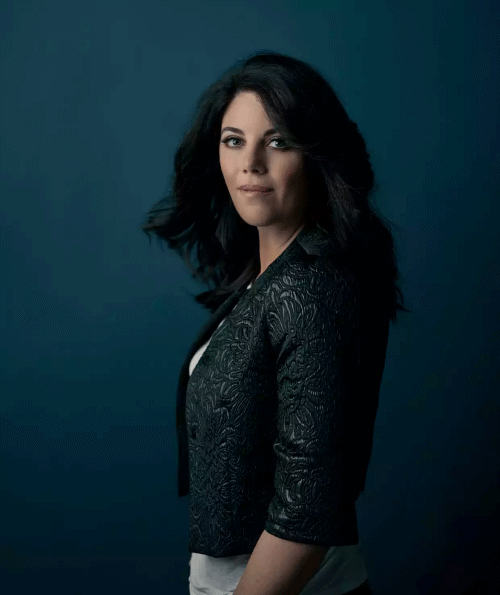
‘It was a very desolate 10 years for me. I was really floundering. I could not find my way.’ Photograph: Steve Schofield for the Guardian
“That people could read the transcripts was horrific enough,” Lewinsky said in her TED talk, “but a few weeks later the audio tapes [the telephone calls Tripp secretly recorded] were aired on TV, and significant portions made available online. The public humiliation was excruciating. Life was almost unbearable.”
“I felt like every layer of my skin and my identity were ripped off of me in ’98 and ’99,” she tells me now. “It’s a skinning of sorts. You feel incredibly raw and frightened. But I also feel like the shame sticks to you like tar.”
She never attempted suicide, she says, “but I came very close”.
“You worked out how you’d do it?” I ask.
“Yes,” she says. “I think some young people don’t see suicide as an ending, but as a reset.”
***
Back then, the world basically saw Lewinsky as the predator. Late-night talkshow hosts routinely made misogynistic jokes, with Jay Leno among the cruellest: “Monica Lewinsky has gained back all the weight she lost last year. [She’s] considering having her jaw wired shut but then, nah, she didn’t want to give up her sex life.” And so on.
In February 1998, the feminist writer Nancy Friday was asked by the New York Observer to speculate on Lewinsky’s future. “She can rent out her mouth,” she replied.
I hope those mainstream voices wouldn’t treat Lewinsky quite this badly if the scandal broke today. Nowadays most people understand those jokes to be slut-shaming, punching down, don’t they?
“I hope so,” Lewinsky says. “I don’t know.”
A lot of vicious things that happen online to women do happen at the hands of men, but women are not immune to misogyny
Either way, misogyny is still thriving. When the Guardian began researching the online harassment of its own writers, they discovered something bleak: of the 10 contributors who receive the most abuse in the comment threads, eight are women – five white, three non-white – and the other two are black men. Overall, women Guardian writers get more abuse than men, regardless of what they write about, but especially when they write about rape and feminism. I noticed something similar during my two years interviewing publicly shamed people. When a man is shamed, it’s usually, “I’m going to get you fired.” When a woman is shamed it’s, “I’m going to rape you and get you fired.”
With statistics like these, it’s no surprise that many consider this an ideological issue – that the focus should be on combatting the misogynistic, racist abuse committed by men. But Lewinsky doesn’t see it that way. “A lot of vicious things that happen online to women and minorities do happen at the hands of men,” she says, “but they also happen at the hands of women. Women are not immune to misogyny.”
“That happened to you,” I say. “With people like Nancy Friday. You found yourself being attacked by ideologues.”
“Yes,” Lewinsky says. “I think it’s fair to say that whatever mistakes I made, I was hung out to dry by a lot of people – by a lot of the feminists who had loud voices. I wish it had been handled differently. It was very scary and very confusing to be a young woman thrust on to the world stage and not belonging to any group. I didn’t belong to anybody.”
I tell Lewinsky that I think the problem with focusing all the attention on misogynists and racists is that it’s bound to legitimise certain types of bullying. I’ve seen men try to speak up about their online abuse only to be met with a barrage of “stop whining” and “check your privilege”. The sentimental view is that men tend to recover from online bullying just fine, whereas women are crushed; but psychologists will tell you there are bigger differences between individuals than gender when it comes to overcoming abuse.
“It’s very easy to get micro, especially when someone is telling you a personal story that’s gutting,” Lewinsky says. “And it’s important to highlight which groups experience cyberbullying the most. But this is an umbrella problem, and under this umbrella sit many people who suffer online harassment for many different reasons.”
I thought that if I retreated from public life, the narrative would dissipate. But instead it ran away from me even more
Lewinsky’s outlook on her scandal has been doggedly non-ideological from the start. “I’m endlessly fascinated by how people derive meaning in life,” she says, “the chasm between how idealised people pretend life is and how complex we really are.” She’s written that she thought it was stupid and wrong in the 1990s when most people blamed her for the affair with President Clinton, but also stupid and wrong in the 2010s when people got more enlightened and started retrospectively blaming him. There’s an extraordinary moment in the 2002 HBO documentary, Monica In Black And White. It’s a kind of Ask Me Anything session, with Lewinsky taking questions from an audience of graduate students and HBO staff. Towards the end, a man stands up and asks, “How does it feel to be America’s premier blowjob queen?” There are gasps from the audience.
“I don’t actually know why this whole story became about oral sex,” Lewinsky replies. “It was a mutual relationship.”
When I mention the documentary to Lewinsky, she tells me about the press conference they had for it a week earlier, at the Television Critics Association in Los Angeles: “A reporter told me he was surprised I’d agreed to take part in it. He said, ‘We expected you to crawl under a rock and die.’ Then he said, ‘I misspoke. I meant hide. Not die.’” Lewinsky smiles. “But he did say die.”
In 2005, Lewinsky retreated. She moved to London to take the course in social psychology at the LSE. “It looked at identity, and what happens when your identity is threatened. A threatened identity can be something like getting divorced: you’re someone’s wife and now you’re not someone’s wife. Or losing a child: you’re a parent and now you’re not a parent.”
Her plan after graduating was to get a job and lead “a much more private life, and move towards a more normal developmental path”. But she found that nobody would employ her. The stigma outweighed her qualifications and aptitude. She couldn’t even get volunteer work with a charity. “I was going through such a hard time,” she says, “I felt so shattered, it took me six months to even get up the courage to approach this particular organisation. And when I did, they told me my working there ‘wasn’t a good idea’. It was a very desolate 10 years for me. I was really floundering. I could not find my way.”

Lewinsky leaves her lawyer’s office in 1998; she ‘came very close’ to suicide after being pilloried by the media. Photograph: Tony Gutierrez/AP
She drifted back to London and had coffee with her old LSE professor, Sandra Jovchelovitch. “She said to me, ‘Whenever power is involved, there always has to be a competing narrative. And you have no narrative.’ It was true. I had mistakenly thought that if I retreated from public life the narrative would dissipate. But instead it ran away from me even more.” That’s when Lewinsky realised she had to do something to de-objectify herself.
***
The same words tend to come up again and again when I’ve asked shamed people to describe the most tumultuous aspects of the experience. One of those words is “objectification”. Being shamed feels like being a victim of identity theft. One minute you’re a private individual, working out who you are, your likes and dislikes. The next minute, you’re America’s premier blowjob queen.
The writer Mike Daisey described this sensation to me in a chillingly perceptive way. (He’d been publicly shamed for embellishing the facts of a story about visiting Apple manufacturing plants in China.) “What they want is for me to die,” he said. “They will never say this because it’s too histrionic. But they never want to hear from me again, and while they’re never hearing from me, they have the right to use me as a cultural reference point whenever it services their ends. That’s how it would work out best for them.”
Lewinsky lets out a long sigh of recognition when I quote this to her. “Wow,” she says.
“Mike Daisey carried on,” I say. “He said, ‘I’d never had the opportunity to be the object of hate before. The hard part isn’t the hate. It’s the object.’”
Something else that often comes up is how lonely it feels. “The fear of ostracisation strikes at the core of who we are,” Lewinsky says. “We cannot survive alone.”
Don’t bully the bully. It doesn’t move the conversation forward
These days, she’s often approached by victims of online bullying, “when I’m on the subway, in line for coffee, at dinner parties.” Shamed people tend to seek each other out, the cure for shame being empathy. “Sometimes they’ll say, ‘I went through this, but it’s nothing like what you went through.’ But I tell them that, if I drown in 60ft of water and you drown in 30ft, we both still drowned. You either know what it’s like to be publicly shamed or you don’t.”
And so she’s spent much of the past few years trying to formulate practical advice for them. “To be able to give a purpose to my past, if I’m stuck with my past, feels meaningful to me,” she says. Her number one piece of advice: “Integrate what has happened to you. Integrate the experience, the faster the better.” She knows this can be hard. “There’s shame about the shame. So there’s a tendency to not want to tell someone what’s going on.”
But it worked for her. In 2014, after a decade of silence, Lewinsky wrote an essay for Vanity Fair, headlined Shame And Survival. “The night before it was published, a friend gave me a card with an Anaïs Nin quote: ‘And the day came when the risk to remain tight in a bud was more painful than the risk it took to blossom.’”
As a result she was asked to speak at a Forbes conference, and then came the TED invitation. She knew what a big deal TED was and so she employed “a team in London to help me find my authentic voice in public speaking”. It was worth the effort. Nowadays, charities like the Diana Award are queueing up to work with her. (The Diana Award is an enterprise, endorsed by Princes William and Harry, that hopes to “inspire and recognise social action in young people”.) Of course, most bullying victims don’t have such a highfalutin stage as TED upon which to reclaim their identity, but most bullying victims weren’t bullied relentlessly all over the world for years, often by highfalutin people.
Lewinsky has advice for bystanders, too: “Don’t bully the bully. It doesn’t move the conversation forward. I see bullying as similar to cutting. People who cut are trying to localise their pain. I think with bullying, people are suffering for myriad reasons and are projecting it. Instead of cutting themselves, they’re cutting someone else.”
She knows her advice can sometimes seem hard to stick to, such as when she suggests boycotting unfolding public shaming stories: “Because of the way the algorithm of the internet works, we do have some control. Editors aren’t going to assign stories that aren’t going to get clicks.” But then she confesses that she sometimes clicks on those exciting stories, too.
She came up with her most recent endeavour after some teenagers told her how hard it can be to find the right words. They’d see their friends being bullied online and wouldn’t know what to say. “I realised,” she says, “that our brains process images faster than text, which means the fastest way you can help – the least amount of time between someone feeling alone and upset, and feeling just a tiny bit better – is with an image.”
And so she pitched an idea to Vodafone. Could she design a keyboard of anti-bullying gifs and emojis for them?
“And now you can get them on all carriers,” she says. “Look. Let me show you…”
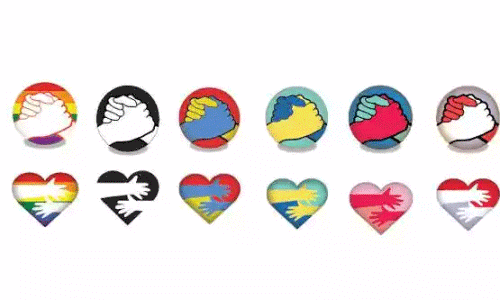
Some of Monica Lewinsky’s new anti‑bullying emojis for Vodafone, inspired by teenagers. Photograph: Vodafone
She pulls out her phone and starts to search for them. I remember something we talked about at the start of the interview – her fear of misspeaking and bringing the maelstrom back down upon her. It’s not an irrational anxiety. Formerly shamed people frequently find themselves suddenly reshamed for the original transgression when they least expect it – when social media hears they’ve got a new job, for instance. We tend to relentlessly define people by the worst mistake they ever made.
“Somewhat unique about my situation,” Lewinsky says, “is that my narrative is tied to other people’s narratives, people on the public stage. And so my narrative gets pulled into things, based on what other people are doing, even if I do nothing.”
As it happens, we are speaking the day after Super Tuesday. Twelve US states held primary elections yesterday and Donald Trump and Hillary Clinton emerged as frontrunners. I’m assuming this is Lewinsky’s least preferred candidate combination. Donald Trump released a campaign video on Instagram that included a photograph of a young Lewinsky in a beret, smiling at Bill Clinton. It felt like a harbinger – a warning shot. He’d already told NBC’s Today Show, back in December 2015, that he considered Lewinsky “fair game” in his battle against the Clintons.
“Are you worried Trump is going to make hay with you?” I ask her.
“I’m not going to answer that,” she replies. “How’s this? I’m affected by what happens on the world stage. But I don’t let it deter me. I’m incredibly grateful for the movement I have in my life right now… OK! Found them!”
She passes me her phone.
There’s a gif on the screen. It’s a big heart with two arms inside it, embracing. The heart shakes.
There’s a TV on the restaurant wall. We’re veiled behind a curtain, so I can only make out the vague shape and the colour of what’s being shown. But it’s obvious. It’s the unmistakable yellow blob of Donald Trump, looming down, yelling from a podium. I look back down at Lewinsky’s delightful, sweet-natured gif, shaking away.
“It feels like a hug!” she says. “Right?”
“I think it looks great,” I say. “It really does feel like a hug.”
“Well, thanks!” she says. She mimes a “phew”. Suddenly all her nerviness is gone. She smiles a huge smile and points at the gif on the screen and says, “I worked my little heart out on it.”
This article was edited on 22 April 2016, to replace the image of Lewinsky’s anti-bullying emojis with a more up-to-date one.
